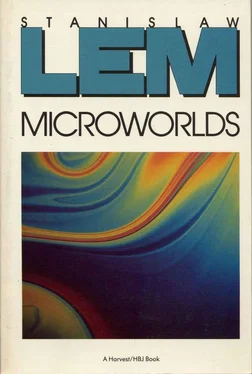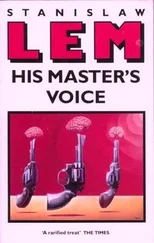As an eight-year-old boy, I fell in love with a girl. I never uttered as much as a word to the girl, but I observed her often in a public garden near our house. The girl had no inkling of my feelings, and most probably never even noticed me. It was a burning, long-lasting love affair dissected, as it were, from all actual circumstances — even from the sphere of any kind of wishful thinking. I was not interested in becoming her friend. My emotions were restricted to worshiping her from afar; aside from that, there was absolutely nothing. May the psychoanalysts make what they will of these feelings of a small boy. I do not comment further on them, because I am of the opinion that such an episode can be interpreted in any way one chooses.
At the beginning, I mentioned the opposites of chance and order, of coincidence and predestination. Only as I wrote the book The High Castle did the thought cross my mind that my fate — my profession as a writer — was already budding in me when I looked at skeletons, galaxies in astrophysical tomes, pictures of reconstructions of the monstrous extinct saurians of the Mesozoic, and many-colored human brains in anatomical handbooks. Perhaps these external circumstances — these impulses and sensuous impressions — helped to shape my sensibility. But that is only speculation.
I not only imagined fantastic kingdoms and domains but also made inventions and mentally created prehistoric animals unheard of in paleontology. For instance, I dreamed up an aircraft shaped like a giant concave mirror, with a boiler situated in the focus. The circumference of the mirror was studded with turbines and rotors to provide lift, as in a helicopter, and the energy for all that was to be derived from solar radiation. This unwieldy monstrosity was supposed to fly very high, far above the clouds, and, of course, only during daytime. And I invented what had already existed for a long time without my knowing it: the differential gear. I also drew many funny things in my thick copybooks, including a bicycle on which one rode moving up and down, as on a horse. Recently, I saw something like this imaginary bicycle somewhere — it may have been in the English periodical New Scientist, but I am not quite sure.
I think it is significant that I never bothered to show my designs to other people; indeed, I kept them all secret, both from my parents and from my fellow pupils, but I have no idea why I acted in this way. Perhaps it was because of a childish affection for the mysterious. The same was the case with my “passports” — certificates and permits that, for instance, allowed one to enter subterranean treasure troves. I suppose also that I was afraid to be laughed at, for, although I knew that these things were only a game, I played it with great seriousness. I divulged something of this childhood world in the book that I have already mentioned, The High Castle, but it contains only a small part of my memories. Why only a small part? I can answer such a question at least partly. First, in The High Castle I wanted to transport myself back into the child that I had been, and to comment on childhood as little as possible from the position of the adult. Second, during its gestation period the book generated a specific normative aesthetic similar to a selforganizing process, and there were certain memories that would appear as dissonances in this canon. It was not the case that I intended to hide certain things because of, say, a feeling of guilt or of shame but, rather, that there were memories that would not fit into the pattern that I presented as my childhood. I wanted — something impossible to attain — to extract the essence of my childhood, in its pure form, from my whole life: to peel away, as it were, the overlying strata of war, of mass murder and extermination, of the nights in the shelters during air raids, of an existence under a false identity, of hide-andseek, of all the dangers, as if they had never existed. For, indeed, nothing of this had existed when I was a child, or even a sixteen-year-old high-school boy. I gave an indication of these exclusions in the novel itself. I do not remember exactly where, but I signaled that I had to or wanted to keep certain matters out by dropping a parenthetical remark that every human being is able to write several strikingly different autobiographies, according to the viewpoint chosen and the principle of selection.
The meaning of the categories of order and chance for human life was impressed upon me during the war years in a purely practical, instinctual manner; I resembled more a hunted animal than a thinking human being. I was able to learn from hard experience that the difference between life and death depended upon minuscule, seemingly unimportant things and the smallest of decisions: whether one chose this or that street for going to work; whether one visited a friend at one o’clock or twenty minutes later; whether one found a door open or closed. I cannot claim that in following my instinct for self-preservation I always employed a minimax strategy of extreme cautiousness. To the contrary, I exposed myself to danger several times — occasionally when I thought it necessary but in some cases through mere thoughtlessness, or even stupidity. So that today, when I think of such idiotically reckless patterns of behavior, I still feel wonder, mingled with bewilderment, about why I acted as I did. To steal ammunition from the so-called Beutepark der Luftwaffe (the depot where the German Air Force stored its loot) in Lvov and to turn it over to somebody totally unknown to me — somebody of whom I knew only that he was a member of the Resistance — I considered to be my duty. (I was in a position to do so since, as an employee of a German company, I had access to this depot.) But when I was instructed to transport something — a gun, in this case — from one place to another just before curfew, and was told, strictly, not to use the tram (I was supposed to walk), it happened that I nevertheless disobeyed the order and climbed onto the footboard of a tram, and that a “Black One” — a Ukrainian policeman who was a member of the auxiliary police of the German occupational forces — jumped onto the footboard behind me and put his arm around me to reach for the door handle. It could have meant an ill end for me if the policeman had felt the gun. My act was insubordination, thoughtlessness, and folly all in one, but I did it anyway. Was it a challenge to fate, or only foolhardiness? Up to this day, I am not sure. (I am better able to understand why I visited the ghetto several times — risky though this was — when it was open to visitors. I had friends there. As far as I know, all, or nearly all, of them were transported to the gas chambers of Belzec in the fall of 1942.)
At this point, the question arises whether what I have reported so far is relevant at all, in the sense of having any direct, causal relationship to my profession as a writer, or to the kind of writing I have done — excluding, of course, autobiographical works like The High Castle. I believe that such a causal relationship exists — that it isn’t mere chance that I attribute in my work such a prominent role to chance as the shaper of human destiny. I have lived in radically different social systems. Not only have I experienced the huge differences in poor but independent, capitalist (if one must call it that) prewar Poland, the Pax Sovietica in the years 1939-41, the German occupation, the return of the Red Army, and the postwar years in a quite different Poland, but at the same time I have also come to understand the fragility that all systems have in common, and I have learned how human beings behave under extreme conditions — how their behavior when they are under enormous pressure is almost impossible to predict.
Читать дальше












